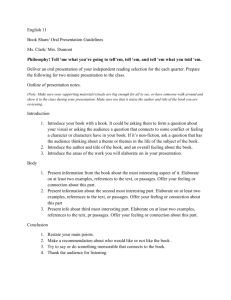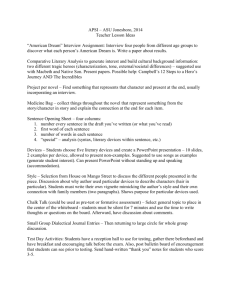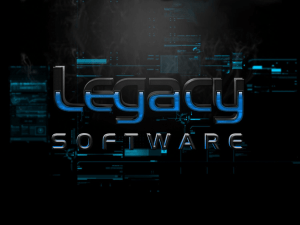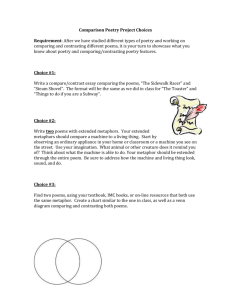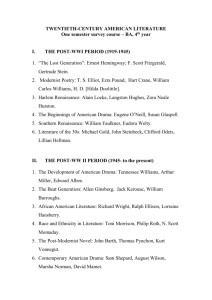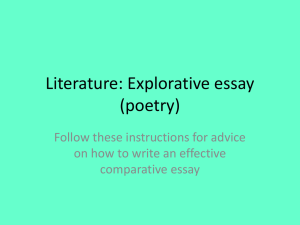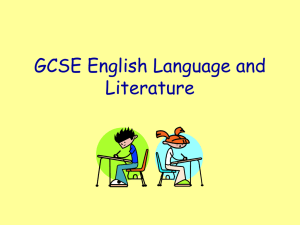Reading Like a Writer with Francine Prose
advertisement
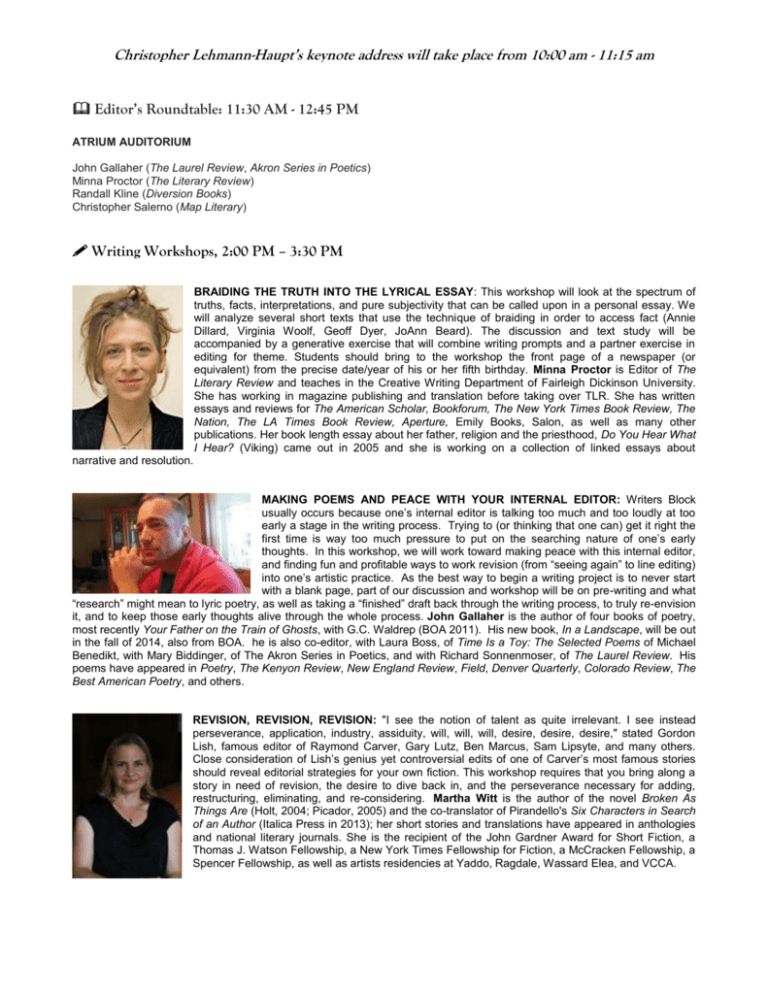
Christopher Lehmann-Haupt’s keynote address will take place from 10:00 am - 11:15 am Editor’s Roundtable: 11:30 AM - 12:45 PM ATRIUM AUDITORIUM John Gallaher (The Laurel Review, Akron Series in Poetics) Minna Proctor (The Literary Review) Randall Kline (Diversion Books) Christopher Salerno (Map Literary) Writing Workshops, 2:00 PM – 3:30 PM BRAIDING THE TRUTH INTO THE LYRICAL ESSAY: This workshop will look at the spectrum of truths, facts, interpretations, and pure subjectivity that can be called upon in a personal essay. We will analyze several short texts that use the technique of braiding in order to access fact (Annie Dillard, Virginia Woolf, Geoff Dyer, JoAnn Beard). The discussion and text study will be accompanied by a generative exercise that will combine writing prompts and a partner exercise in editing for theme. Students should bring to the workshop the front page of a newspaper (or equivalent) from the precise date/year of his or her fifth birthday. Minna Proctor is Editor of The Literary Review and teaches in the Creative Writing Department of Fairleigh Dickinson University. She has working in magazine publishing and translation before taking over TLR. She has written essays and reviews for The American Scholar, Bookforum, The New York Times Book Review, The Nation, The LA Times Book Review, Aperture, Emily Books, Salon, as well as many other publications. Her book length essay about her father, religion and the priesthood, Do You Hear What I Hear? (Viking) came out in 2005 and she is working on a collection of linked essays about narrative and resolution. MAKING POEMS AND PEACE WITH YOUR INTERNAL EDITOR: Writers Block usually occurs because one’s internal editor is talking too much and too loudly at too early a stage in the writing process. Trying to (or thinking that one can) get it right the first time is way too much pressure to put on the searching nature of one’s early thoughts. In this workshop, we will work toward making peace with this internal editor, and finding fun and profitable ways to work revision (from “seeing again” to line editing) into one’s artistic practice. As the best way to begin a writing project is to never start with a blank page, part of our discussion and workshop will be on pre-writing and what “research” might mean to lyric poetry, as well as taking a “finished” draft back through the writing process, to truly re-envision it, and to keep those early thoughts alive through the whole process. John Gallaher is the author of four books of poetry, most recently Your Father on the Train of Ghosts, with G.C. Waldrep (BOA 2011). His new book, In a Landscape, will be out in the fall of 2014, also from BOA. he is also co-editor, with Laura Boss, of Time Is a Toy: The Selected Poems of Michael Benedikt, with Mary Biddinger, of The Akron Series in Poetics, and with Richard Sonnenmoser, of The Laurel Review. His poems have appeared in Poetry, The Kenyon Review, New England Review, Field, Denver Quarterly, Colorado Review, The Best American Poetry, and others. REVISION, REVISION, REVISION: "I see the notion of talent as quite irrelevant. I see instead perseverance, application, industry, assiduity, will, will, will, desire, desire, desire," stated Gordon Lish, famous editor of Raymond Carver, Gary Lutz, Ben Marcus, Sam Lipsyte, and many others. Close consideration of Lish’s genius yet controversial edits of one of Carver’s most famous stories should reveal editorial strategies for your own fiction. This workshop requires that you bring along a story in need of revision, the desire to dive back in, and the perseverance necessary for adding, restructuring, eliminating, and re-considering. Martha Witt is the author of the novel Broken As Things Are (Holt, 2004; Picador, 2005) and the co-translator of Pirandello's Six Characters in Search of an Author (Italica Press in 2013); her short stories and translations have appeared in anthologies and national literary journals. She is the recipient of the John Gardner Award for Short Fiction, a Thomas J. Watson Fellowship, a New York Times Fellowship for Fiction, a McCracken Fellowship, a Spencer Fellowship, as well as artists residencies at Yaddo, Ragdale, Wassard Elea, and VCCA. Light Breakfast and Full Buffet Lunch included THE ART OF CREATIVE NONFICTION Creative Nonfiction is the art of crafting true stories from one’s life experiences. It employs the devices of fiction—narrative tension, voice, description, dialogue, patterns of imagery, dramatic structure (rising action, climax, resolution)—to tell these stories in a way that produces maximum emotional effect. In this workshop, we’ll discuss story structure, and we’ll examine some examples of effective creative non-fiction from the canon of professional writers in the field; but our focus will be on improving student mss. via the revision process. To that end, students are encouraged to bring a sample of their own creative non-fiction (up to five pages) to read at the workshop. Here’s an exercise to get you going: Write about a transformative event in your life (an event or incident that changed you in some way). Be sure to pay attention to setting (time and place), the people involved, and be sure to show us the change in yourself. We will read and discuss as many as we have time for. Philip Cioffari’s latest novel, DARK ROAD, DEAD END, is forthcoming in 2014. His previous books are: the novel, CATHOLIC BOYS; the short story collection, A HISTORY OF THINGS LOST OR BROKEN, and the novel, JESUSVILLE. His short stories have been published widely in magazines and anthologies, including North American Review, Playboy, Michigan Quarterly Review, Northwest Review, and elsewhere. He has written and directed for Off and Off-Off Broadway. His Indie feature film, which he wrote and directed, LOVE IN THE AGE OF DION, has won numerous awards, including Best Feature Film at the Long Island Int’l Film Expo, and Best Director at the NY Independent Film & Video Festival. He is a Professor of English, and director of the Performing and Literary Arts Honors Program, at William Paterson University. BREAKING THE LINE: In this poetry workshop, we will look at the line breaks in poems and consider their efficacy and force. Beyond breaking line because "it feels good," there are many other things to keep in mind, whether they be metrical, syllabic, visual, prosaic, grammatical, stanzaic. To start things off, we'll look at a poem or two by William Carlos Williams and Louise Gluck and then proceed to student work. Timothy Liu is the author of ten books of poems including the forthcoming Don't Go Back To Sleep (Saturnalia Books, 2014). Translated into many languages, his poems and papers are archived in the Berg Collection at the New York Public Library. A Professor of English at William Paterson University, he lives with his husband in Manhattan. EDITING YOUR NOVEL FOR COMMERCIAL PUBLICATION: For many authors, success is marked by steps in the publishing process. First, an agent agrees to represent you. Then, a publisher pays to publish you. Getting to these two points, however, can be an enormous struggle, and once your work has been “purchased” by a publishing house, you may begin a revision process that can often be fraught. That’s not to say that having a novel published is inevitably going to be a struggle—often it teaches an author more about his or her writing than any class, and the editorial process can be like having your own individual workshop. Randall Klein is the acquisitions editor at Diversion Books, a small publisher based in New York. Prior to that, he was an Associate Editor in the Random House Publishing Group and, before that, he was a foreign rights agent at Trident Media Group, one of the largest literary agencies in the country. He has edited dozens of published works, having frequently wonderful, occasionally contentious editorial relationships with authors. Randall will be discussing the ins and outs of the publishing industry, specifically focusing on what happens when your art turns into commerce, and what the role of an author has become in a changing marketplace. ----------------------------------------------------------------------------------------------------------------------------------------------------------------------------------------------------------------------REGISTRATION Includes Light Breakfast, 9:15-10:00 am Keynote Address with Christopher Lehmann-Haupt, 10:00-11:15 am Editors Roundtable Discussion, 11:30 am-12:45 pm Buffet Lunch, 12:45-2:00 pm Writing Workshops, 2:00-3:30 pm Tickets: Regular $55. WPU Alumni $44. WPU Graduate Students $33. WPU Undergraduate Students $22. Late registration (after April 1st) is $66, so please register early. http://www.wpunj.edu/writing http://www.eventbrite.com/event/9916881660 Questions? Contact Christopher Salerno at 973-720-3061 or salernoc3@wpunj.edu
